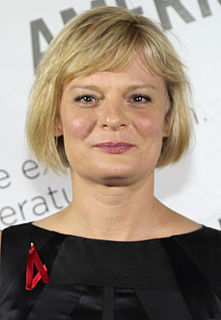A Quote by Thomas Metzinger
The conscious experience of being a subject arises when a single organism learns to enslave itself.
Related Quotes
It is what makes conscious of the conditions and laws of observing which applied in this manner become a theme on its own. The activity of consciousness depending on the way the work itself proceeds, becomes the subject of my attention this way and it is precisely because of this voyeuristic attitude toward the own observation and experience of the subject that the conscious analytic dimension in the work shows.
God is not a person; God is manifestation itself. We think that God is a superhuman person, but God is not a person. He is not a subject. We can never experience God in a subject/object experience. God is what makes a subject/object experience possible. We can never see God or experience God as separate from ourselves. God is a being but there is no division.
A new consciousness is developing which sees the earth as a single organism and recognizes that an organism at war with itself is doomed. We are one planet. One of the great revelations of the age of space exploration is the image of the earth finite and lonely, somehow vulnerable, bearing the entire human species through the oceans of space and time.
He who thinks he can have flesh and bones without being subject to any external influence, or any accidents of matter, unconsciously wishes to reconcile two opposites, viz., to be at the same time subject and not subject to change. If man were never subject to change there could be no generation; there would be one single being, but no individuals forming a species.
Children learn what they live.
If a child lives with criticism... he learns to condemn.
If he lives with hostility... he learns to fight.
If he lives with ridicule... he learns to be shy.
If he lives with shame... he learns to be guilty.
If he lives with tolerance... he learns confidence.
If he lives with praise... he learns to appreciate.
If he lives with fairness... he learns about justice
The simplest single-celled organism oscillates to a number of different frequencies, at the atomic, molecular, sub-cellular, and cellular levels. Microscopic movies of these organisms are striking for the ceaseless, rhythmic pulsation that is revealed. In an organism as complex as a human being, the frequencies of oscillation and the interactions between those frequencies are multitudinous.
The subject who speaks is situated in relation to the other. This privilege of the other ceases to be incomprehensible once we admit that the first fact of existence is neither being in itself nor being for itself but being for the other, in other words, that human existence is a creature. By offering a word, the subject putting himself forward lays himself open and, in a sense, prays.








































